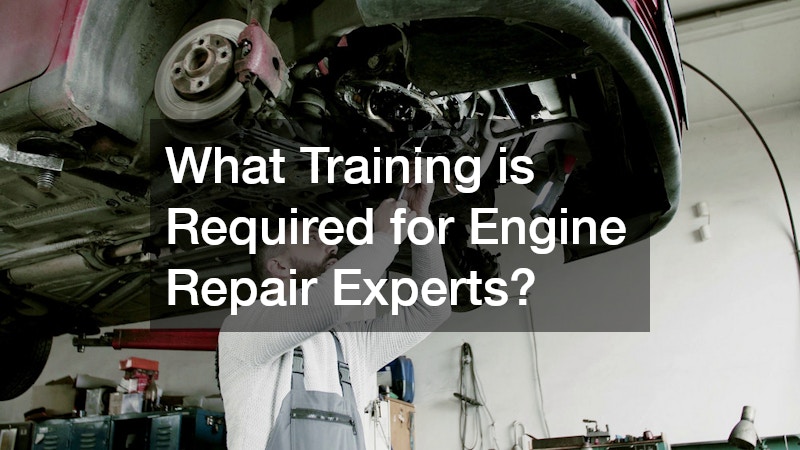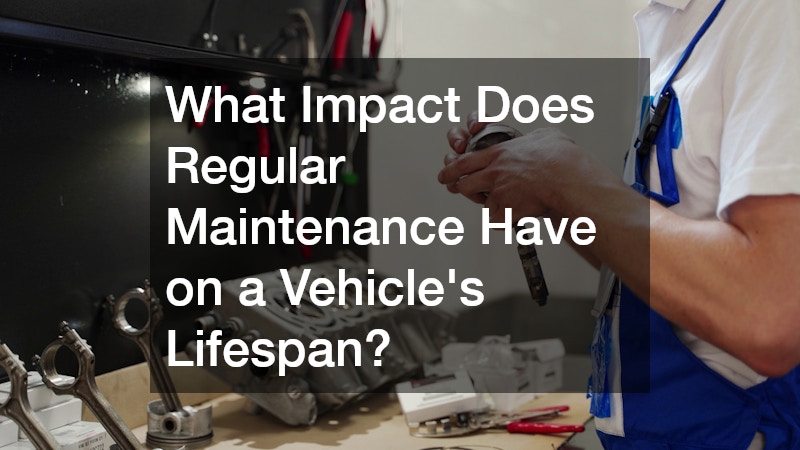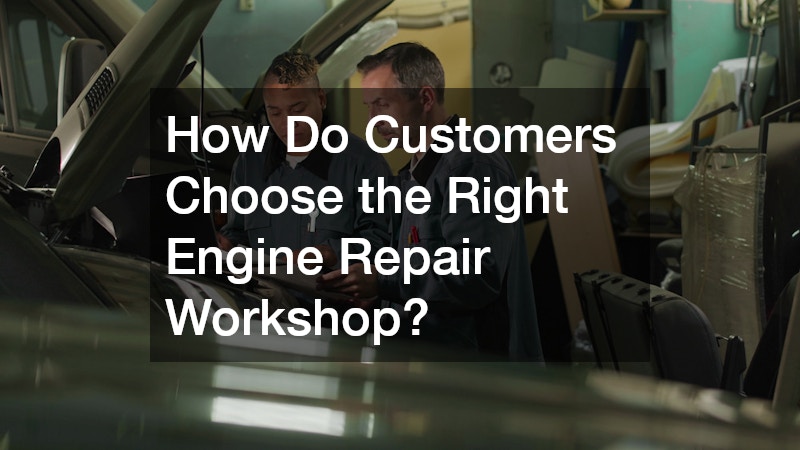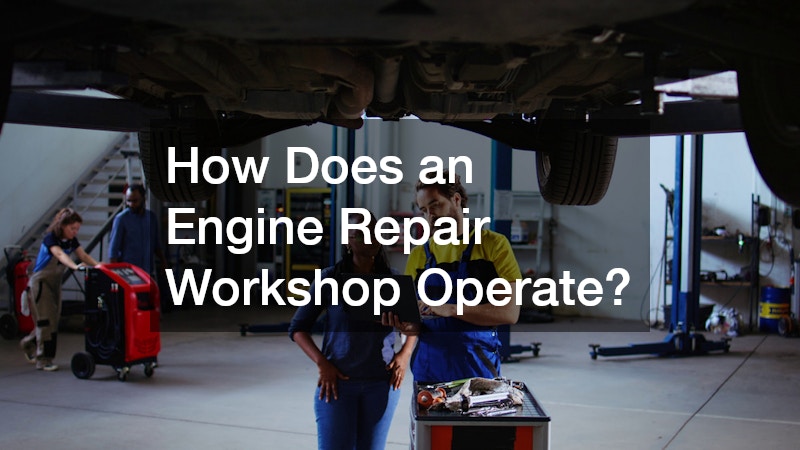
Inside an Engine Repair Workshop: How Auto Repair Shops and Auto Body Experts Keep Cars Running and Looking New
Introduction
Vehicles are more than just transportation—they are an investment, a daily necessity, and often an expression of personal style. Keeping them in peak condition requires more than occasional car washes or topping off fluids. Regular maintenance, timely auto repairs, and expert handling at an engine repair workshop are critical to prolonging lifespan and preserving value. From resolving engine issues to fixing dents and scratches, auto body shops and specialized technicians work behind the scenes to ensure cars run smoothly and look their best. Even vehicles that began life as junk cars can be transformed with the right combination of mechanical expertise, aesthetic care, and modern technologies. Understanding the full scope of what goes on in a workshop helps car owners make informed decisions and maintain their vehicles effectively.
How Does an Engine Repair Workshop Operate?
A well-run engine repair workshop functions as a hub of organization, expertise, and technology. Efficient operations ensure that each vehicle, whether it requires major car repair or minor auto repairs, is handled systematically. Every step, from diagnostics to finishing touches, is coordinated to optimize time, quality, and customer satisfaction.
The Role of Technology in Modern Workshops
Modern workshops are equipped with diagnostic tools that go far beyond wrenches and hammers. Computerized systems, sensors, and engine analyzers allow technicians to identify problems quickly and accurately. Even an auto glass repair company within the same shop may use digital alignment tools to ensure safety and performance. Technology streamlines workflow, reduces human error, and improves turnaround times, making routine auto repairs and complex engine work more efficient. This reliance on technology also allows workshops to handle newer, more complex vehicles that require precision and advanced diagnostics.
Key Personnel and Their Responsibilities
From certified mechanics to auto body specialists, each member of the workshop team has distinct roles. Engine repair experts focus on internal combustion issues, transmission concerns, and electronic diagnostics, while local auto body repairs professionals handle dents, paint touch-ups, and auto wraps. Service coordinators ensure that customer requests, such as scheduling a car repair or replacing a windshield, are communicated clearly to the technicians. Having clearly defined responsibilities ensures no detail is overlooked during the repair and restoration process.
Workflow: From Analysis to Repair
Typically, a vehicle enters the workshop for an initial assessment, during which technicians inspect both mechanical and aesthetic aspects. Auto repairs may include oil changes, brake replacements, or engine overhauls, while auto body shop specialists examine panels, trim, and paint. Once diagnostics are complete, the team prepares a plan of action, orders necessary parts from suppliers, and executes the repairs systematically, ensuring the car is returned in optimal condition. A structured workflow ensures that each repair stage is completed efficiently without compromising quality.
What Services are Offered at an Engine Repair Workshop?
Engine repair workshops provide a comprehensive suite of services tailored to both performance and appearance. Understanding the full range of services helps vehicle owners select the right shop for their specific needs.
Common Repair Services
These services range from routine maintenance, such as oil and filter changes, to complex engine rebuilds, transmission repairs, and car repair following collisions. Many shops also offer auto glass repair company services for chipped windshields or full replacements, ensuring the vehicle’s safety and compliance with regulations. Offering both mechanical and cosmetic services allows one location to address all vehicle care needs efficiently.
Specialized Technologies and Tools
Specialized tools, including computerized diagnostic systems, lift equipment, and paint booths, allow technicians to handle intricate tasks. For instance, local auto body repairs for custom auto wraps or epoxy-coated floor mats require precision equipment to deliver professional-grade results. The availability of advanced tools ensures that even complex or custom modifications meet high-quality standards.
Preventive Maintenance and Seasonal Services
Workshops often provide seasonal inspections and maintenance, like checking heating systems before winter or air conditioning efficiency in summer. Preventive care reduces unexpected breakdowns, minimizes expensive car repair costs, and prolongs the life of both new and older vehicles. Regular preventive checks help owners avoid costly emergency repairs and extend the overall lifespan of their cars.
How Do Auto Professionals Diagnose Engine Problems?
Accurate diagnosis is the first step toward effective repair, saving time, cost, and frustration for car owners. Proper diagnostics also help prioritize repairs, ensuring the most critical issues are addressed first.
Diagnostic Tools and Techniques
Mechanics use scan tools, compression testers, and emission analyzers to pinpoint issues. Error codes from onboard computers can identify malfunctioning sensors, while physical inspections reveal leaks, corrosion, or wear. Even in a full-service auto body shop, understanding mechanical diagnostics ensures that exterior fixes do not mask deeper engine problems. These tools allow for precision work that prevents recurring issues and unnecessary part replacements.
Importance of Test Drives
Test drives allow technicians to experience symptoms firsthand, such as unusual vibrations, noises, or braking inconsistencies. Observing a vehicle in motion complements the data from diagnostic tools, providing a complete picture of required auto repairs. Test drives can also help identify problems that static diagnostics might miss, like engine hesitations or suspension noises.
Reading and Understanding Error Codes
Engine computers generate codes when something goes wrong, and interpreting them accurately requires skill and experience. Whether it’s an issue in the fuel injection system or transmission, understanding these codes guides mechanics in performing precise repairs that prevent repeat visits. Correct interpretation of codes ensures that repair efforts are targeted and effective, saving time and money for both the shop and the customer.

What Training is Required for Engine Repair Experts?
Expertise in auto repairs comes from formal education, hands-on experience, and continuous learning. Well-trained staff are critical for maintaining high service quality and customer trust.
Certification Programs and Workshops
Mechanics often pursue certifications such as ASE (Automotive Service Excellence) to validate their skills. Specialized courses in engine repair, auto glass repair company techniques, or bodywork improve their qualifications and keep them current with industry standards. Certification reassures customers that repairs meet industry standards and safety regulations.
On-the-Job Experience
While classroom instruction is vital, practical experience with various vehicles—from compact cars to high-end models or even previously junk cars—is irreplaceable. Local auto body repairs teams gain unique insights by working on a wide range of issues. Hands-on experience allows technicians to quickly diagnose problems and deliver practical solutions.
Continuous Education and Skill Updates
The automotive industry evolves rapidly, introducing hybrid engines, electric vehicles, and advanced diagnostics. Workshops that prioritize ongoing training ensure their technicians can handle new systems efficiently, whether it’s precision car repair or high-quality auto wraps. Ongoing education helps workshops remain competitive and capable of handling modern vehicle technologies.
How Do Auto Body Shops Enhance Vehicle Aesthetics?
While engine repair workshops focus on functionality, auto body shops ensure vehicles look as good as they perform. A polished exterior and well-maintained interior complement mechanical reliability for overall vehicle value.
Paint Matching and Application Techniques
Matching factory paint or creating custom color schemes requires expertise and specialized equipment. Auto wraps offer an alternative to traditional paint, allowing for temporary or permanent visual enhancements. Accurate paint application and quality auto wraps maintain a vehicle’s resale value while offering personalization options.
Dent and Scratch Repairs
Small dents, scratches, and collision damage are repaired using tools like suction pullers, body fillers, and sanding techniques. Skilled local auto body repairs technicians can restore surfaces to near-original condition. Proper repair techniques prevent further rusting or degradation and enhance the car’s overall appearance.
Customization Options for Personalization
From adding custom decals to complete vehicle makeovers, auto body shop services allow drivers to personalize their cars. This can include unique floor tile-style interior inlays or epoxy-coated floor areas in specialized vehicles. Customization lets car owners express individuality while maintaining functionality and safety.

What Impact Does Regular Maintenance Have on a Vehicle’s Lifespan?
Routine maintenance is the single most effective way to preserve a car’s performance and value. Neglecting regular care can lead to costly repairs and shortened vehicle lifespan.
Key Maintenance Practices
Oil changes, tire rotations, brake inspections, and regular engine checkups prevent major issues. Pairing mechanical maintenance with auto body shop services, such as timely touch-ups, helps vehicles stay in excellent condition. Proper maintenance keeps both mechanical and aesthetic components in peak condition.
Long-Term Benefits of Routine Checkups
Consistent maintenance improves fuel efficiency, reduces the frequency of car repair needs, and can increase resale value. Even older vehicles or previously junk cars benefit from proactive attention. Preventive care also enhances safety and reduces the risk of breakdowns on the road.
Cost-Saving Measures Through Preventive Care
Identifying problems early, like worn brake pads or minor engine leaks, is far less expensive than emergency repairs. Preventive care ensures safer, more reliable vehicles, which reduces unexpected auto repair costs over time. Investing in preventive measures often pays off by avoiding major repairs and downtime.
How Do Repair Shops Ensure Quality and Safety?
High-quality service is the foundation of trust between customers and auto repair shops. Safety and precision are non-negotiable in both mechanical and aesthetic work.
Following Industry Standards
Mechanics and auto body experts adhere to safety regulations and manufacturer guidelines. Compliance ensures repairs, such as engine overhauls or auto glass replacements, meet legal and safety requirements. Adhering to standards protects both technicians and vehicle owners from liability.
Quality Control Mechanisms
Checklists, inspections, and road tests guarantee that repairs are effective and durable. Local auto body repairs teams often conduct multiple quality assessments before returning a car to its owner. Quality control prevents recurring issues and reinforces customer confidence.
Customer Feedback and Repeated Checks
Many workshops seek post-service evaluations to verify satisfaction. Repeat inspections, especially for auto wraps or bodywork, ensure long-lasting results. Gathering feedback helps improve services and maintain a strong reputation.
How Do Engine Repair Workshops Stay Environmentally Friendly?
Sustainable practices protect both vehicles and the planet. Environmentally conscious operations also appeal to a growing segment of eco-aware customers.
Eco-Friendly Disposal of Hazardous Materials
Used oil, brake fluid, and old batteries are disposed of responsibly to prevent environmental contamination. Auto glass repair companies also recycle broken glass when possible. Proper disposal reduces the ecological impact of automotive operations.
Use of Sustainable Products and Practices
Workshops increasingly use low-VOC paints, water-based cleaning solutions, and energy-efficient equipment. Even choosing eco-friendly floor tile or epoxy floors in customized interiors supports sustainability. Sustainable practices reflect a workshop’s commitment to social responsibility.
Energy Efficiency in Operations
Lighting, heating, and machinery are optimized to reduce energy use, demonstrating responsible business practices to environmentally conscious customers. Energy-efficient operations also help reduce operating costs, benefiting both the workshop and its clients.

How Do Customers Choose the Right Engine Repair Workshop?
Selecting a reliable shop involves research, verification, and personal judgment. Choosing the right professionals ensures peace of mind and quality results.
Research and Recommendations
Seek suggestions from friends, family, or online communities. Experienced mechanics in auto repair shops and local auto body repair teams often receive word-of-mouth referrals from satisfied clients. Personal referrals often indicate a track record of reliability and skill.
Evaluating Expertise and Credibility
Check licenses, certifications, and past work experience. Reviewing previous car repair projects, whether for high-end vehicles or transformed junk cars, indicates the shop’s capability. Proper evaluation prevents costly mistakes and ensures a high standard of service.
Importance of Customer Reviews and Testimonials
Reading reviews provides insight into timeliness, professionalism, and quality of work. Customers often mention experiences with services like auto wraps or auto glass repair, giving prospective clients a fuller picture. Reviews also highlight how well the workshop communicates and addresses concerns.
What Are the Latest Trends in Engine Repair Workshops?
The automotive industry constantly evolves, and so do workshops. Keeping up with trends ensures that repair shops meet modern vehicle requirements efficiently.
Adoption of Cutting-Edge Diagnostic Technologies
Advanced software and scanning tools help identify engine issues with precision, reducing unnecessary part replacements and improving efficiency. These technologies enhance both accuracy and turnaround time for repairs.
Advancements in Repair Techniques and Materials
From stronger, lighter materials for auto body shop repairs to eco-friendly coatings for epoxy floors, innovation improves longevity and aesthetics. Adopting modern techniques ensures vehicles are restored with the best available solutions.
The Future of Automation in Auto Repair
Robotic systems assist with painting, welding, and assembly, reducing human error and labor time. Automation promises faster car repair and improved consistency in services like local auto body repairs or custom auto wraps. Automation also allows workshops to handle higher volumes while maintaining quality standards.
Conclusion
Engine repair workshops, in tandem with auto body shops, play a vital role in maintaining vehicle performance and aesthetics. From diagnosing engine problems and performing critical auto repairs to restoring appearance through paint, dent removal, and auto wraps, these professionals ensure cars operate safely and look impressive. Their expertise safeguards both mechanical reliability and visual appeal, creating a comprehensive service experience for car owners.
By embracing technology, rigorous training, and sustainable practices, modern workshops are prepared to meet evolving industry demands. Whether handling a routine car repair, upgrading an older vehicle, or transforming junk cars into show-ready machines, local auto body repairs and engine specialists provide expertise and peace of mind. Choosing a capable workshop ensures that vehicles remain in top condition while saving owners time and money in the long run.
For car owners, understanding how workshops operate, what services they offer, and how to select the right professionals ensures that vehicles remain reliable, safe, and stylish for years to come. Investing in skilled professionals and preventative care ultimately protects the value and longevity of your vehicle.



